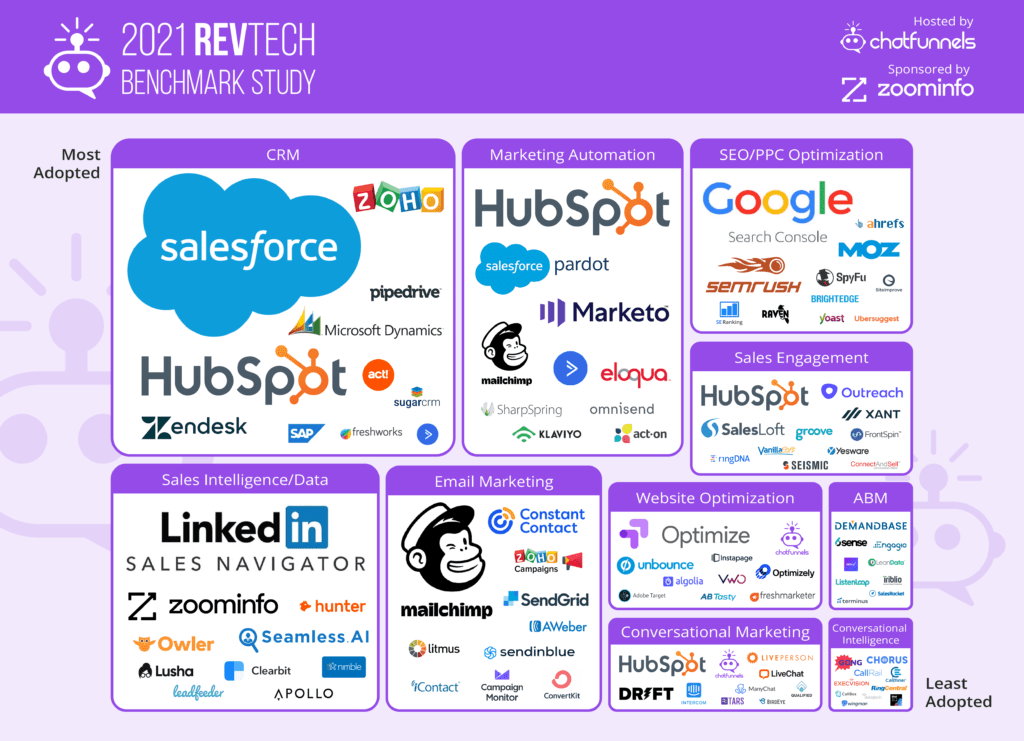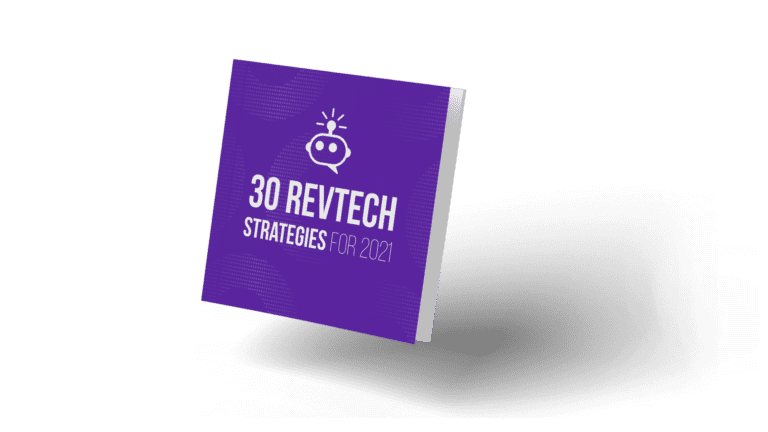Reading Time: 5 minutes
We are thrilled to announce that we will have another virtual event on April 28, 2021. If you liked the RevTech Summit, you’ll love our next one! Register now for the next Demand Gen Summit 2021 to learn more top-notch strategies for leadership skills, best selling practices, and demand generation.
Now let’s recap our most recent summit!
On January 27, 2021, we hosted the first ever RevTech Summit.
The focus of this virtual event was marketing and sales automation and revenue analytics.
There were 2335 registrants and 10 hours of content. 30 of the industry’s top marketing, sales, and technology experts shared their insights on how to optimize your tech stack to get ahead in 2021. Their tips apply to companies as small as 2-3 person start-ups as well as up to fortune 500 companies.
Here are some of the speakers we heard from:
- Godard Abel from G2
- Heather Zynczak from Pluralsight and Domo
- Rick Tolman from Pluralsight
- Scott Sutton from ZoomInfo
- Jon Miller from Demandbase
- Latané Conant from 6sense
- Lindsey Boggs from Citrix
- Mario Martinez from Vengreso
- Jiff Huffman from GrowthHit
RevTech Summit Award Winners
Leading up to the summit, 53 of the top leaders were community nominated and over 1400 votes were cast for the RevTech Awards. Billy Bateman, Co-founder and VP of operations of ChatFunnels, announced the winners on the day of the summit.
1. The Top 3 RevTech Visionaries: Mario Martinez, Chris Beall, Mikkel Svane
2. The Top 3 RevTech Power Users: Sebastian Benitez, Nagaraja Javvaji, Ernest Owusu
3. The Top 3 RevTech Data Scientists: RJ Horning, Shelly Fagin, Rick Tolman
4. The Top 3 RevTech Stack Architects: Roderick Jefferson, Colton Yourell, Sandy Carter
Annual RevTech Benchmark Study
A trend we have been seeing is that marketing and sales are aligning their technology stacks.
But what tools are people actually using to drive pipeline and close more revenue?
Dr. James Oldroyd, Associate Professor of Strategy at BYU, partnered up with us here at ChatFunnels to conduct a survey in order to answer the question of what marketing and sales technologies people are most using.

We broke it up into tools that are being paid for and used by sales, sales & marketing, and then solely marketing teams. in addition, it’s then further categorized by marketing automation, email marketing, ABM, SEO & PPC, website automation, CRM, conversational marketing, sales intelligence, sales engagement, and conversational intelligence.
Breakdown of the Results
There were 800+ respondents to the survey, and the results might be surprising to some of you.
After comprising and analyzing all the data, we discovered that companies are poor users of tools. Dr. Oldroyd had hypothesized a much higher usage of revenue and sales acceleration tools, but that simply wasn’t the case.
The least used tools are conversation intelligence tools and the most adopted tools are CRMs.
Why do people least adopt conversation intelligence tools?
Is it because they are the newest tools out there? Is it because companies don’t have the resources to integrate these tools into their tech stacks? Shockingly enough, there is no significant difference between large and small companies with respect to tool adoption. In other words, large companies do not have higher adoption, which is what most of us would assume.
So if it’s not money, what can explain these low adoption rates?
Well, it’s a combination of several factors.
These tools are marketed to be fix-all solutions, when in reality there is a lot of time investment into training a team to use the tool and use it effectively. It’s like giving someone a bike who doesn’t know how to ride it. There is so much potential for them to travel more efficiently, but the bike it’s useless if no one teaches them how to ride it.
This can be summed up by saying that large, medium, and small firms are all lacking the proper training when purchasing new tools.
If companies aren’t willing to invest in the user experience with the tool, then we won’t ever see adoption rates increase.
Jim Oldroyd said it best: “If you’re going to get a tool, make sure you use it.”
If you want to check out the whole study, download a copy of it here.
Also, for a further explanation of the market map, check out this article!
Keynote Speakers
This time around we had two keynote speakers: Godard Abel, Co-founder & CEO of G2, and Heather Zynczak, Former CMO of Domo and Pluralsight.
Godard Abel

Godard Abel is the co-founder and CEO of G2. He previously built cloud CPQ pioneers BigMachines (acquired by Oracle) and SteelBrick (acquired by Salesforce).
In the keynote, he discussed how G2 started and what Martech trends he sees emerging in the market.
Abel started G2 to create a better buying experience for companies looking for technology. He also wanted to make it easier for companies with useful software to be discovered. It is a peer review site where customers can leave their user reviews for business software.
“We thought, why can we get more insight on a $100 hotel room on TripAdvisor than we can get on a $100,000 CRM package? We just wanted to bring that consumer model with peer reviewed user reviews and real time information and try to make buying B2B apps more like shopping on Amazon.”
Abel predicts that the marketing technology industry will continue to grow year by year. Last year alone, there have been 1000 new apps listed in G2 in the sales and marketing technology categories.
Abel also looked at how Covid impacts which technologies companies are looking for. For example, since the pandemic, the search for video conferencing software is up 300%.
Finally, Abel advised all marketing and sales professionals to take a step back and focus on the customer journey. It is changing faster than ever before. He encouraged individuals to focus on the customer. Above all, if you don’t change the way you are selling, you’ll be left behind.
Heather Zynczak

Heather led marketing and product marketing for two Silicon Valley startups before joining Oracle, where she worked in Product Strategy, leading the vision for 20+ products. She is a well-known thought leader whose writing has appeared in Fast Company, Forbes, Fortune, Inc. and other high-profile publications.
In her keynote, Heather Zynczak looked back on her success at Domo and Pluralsight. She then gave four pieces of advice to all professionals looking to create a successful career.
1. Find a company that’s poised for growth. Heather was attracted to Domo and Pluralsight because of the potential they had for growth. She recommends working for a company that has a technology in place and is ready to take off. She also addressed how the pandemic has created a space of innovation. Companies need to start to think outside the box in order to properly and effectively innovate.
2. Be analytical and data driven. “Everything can and should be measured.” In short, measuring data gives companies the freedom to be creative and try new things.
3. Whatever you’re doing, knock it out of the park. This applies to all aspects of your life, not just your career. If you work your hardest at EVERYTHING you do, it will open doors and give you further opportunities.
4. Think the impossible and dream big. When working to grow a company, dreaming big is crucial. Heather shared how she followed this advice when planning her first event for Pluralsight. She invited Michelle Obama to be the keynote speaker and shockingly, she accepted. This proves that in order to achieve great things, you need to be willing to do the impossible.
30 RevTech Strategies for 2021
Summaries of each of the speakers’ presentations at the RevTech Summit have been compiled into a comprehensive e-book titled “30 RevTech Strategies for 2021.”
Download the e-book now to learn bonus tips from each speaker and more insights into creating an optimal tech stack to drive more revenue.

READ MORE
Start seeing your Buyers' signals
Signals is helping companies automate, grow, and close sales pipeline with industry-leading predictive intent scoring, lead generation, and real-time engagement.






















